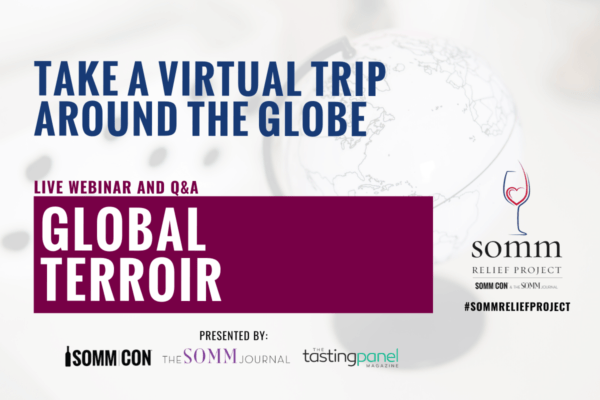FREE WEBINAR AND Q&A WITH BEVERAGE INDUSTRY LEADERS
Let’s take a virtual trip around the globe and a literal look through our screens at some unique terroirs as explained by the people behind them. Quarantine may have our bodies locked up at home, but modern technology will let our eyes and minds travel. The learning doesn’t stop – please join us for a 90-minute trip to California, Washington, Uruguay, France, Italy, Mexico and beyond!
- Hear directly from winemakers and proprietors of unique properties around the world
- See for yourself the factors that make their little corner of the world unique and inimitable
- Understand the unique advantages and personal stories behind each label
- Find out how wineries are coping with quarantines and an uncertain market
Panelists include:
- Tim Henley, Winemaker of Thick Skinned on the terroir of Red Mountain, Washington
- Charlie Tsegeletos, Head Winemaker for Cline Cellars on Sonoma Valley terroir
- Chris Radomski, Founder of La Adelita Tequila on Jalisco terroir
- Christian Wylie, Managing Director of Bodega Garzon on Uruguay terroir
- Jean Charles Boisset, Proprietor Domaine de la Vougeraie on Burgundy terroir and The Boisset Collection Ambassador Program
- Jacob Gragg, USA Brand Ambassador for Ca’ del Bosco on the terroir of Franciacorta
- Moderator: Lars Leicht, VP/Communication & Education, The SOMM Journal and The Tasting Panel Magazine
Missed the live webinar? Access this session and our entire library of training and educational videos on-demand with a subscription to SommGo, SommCon’s new e-learning platform. Start your 7-day free trial today and let the learning begin!
RESOURCES DISCUSSED DURING WEBINAR
Boisset Collection Ambassador Program
SOMM Relief Project
WEBINAR Q&A
Q: Where were the original vineyards planted on the hillside and how has it diversified through the years?
A: Tim Henley, Winemaker of Thick Skinned – The first planting was Kiona in 1975. Within a few weeks after that, Ciel du Cheval was planted (see map below, click to enlarge). We source from Kiona Heart of the Hill for the Thick Skinned project. As vineyards developed you saw changes in spacing, row direction and the implementation of Vertical Shoot Positioned (VSP) trellising. Some of the newest plantings (not on this map) are higher on the mountain with high density plantings.
Q: Could you provide more detail about Cline’s work with the old vineyards – age, varietals they work with, any other sites outside of CC county, and if/how they are working to preserve those vineyards and others that have the possibility to become ‘ancient’?
A: Charlie Tsegeletos, Head Winemaker for Cline Cellars – All of our old vines are in Contra Costa County and in Lodi. In CC, we have Zin (1900, 1906, 1910), Carignane (1906, 1925), Mourvedre (1920) and a little bit of Alicante Bouschet (1910) and Palomino (1935). They are almost all on their own roots and the sandy soil has done a good job protecting them from the ravages of phylloxera. They are dry farmed, and we don’t do much else other than farm them, sulfur dust as needed. We do replace misses. Our vineyard manager did uproot and replant a few acres of the old Alicante and Mourvedre and they took – I had never seen old vines replanted like that.
As to the Lodi Zinfandel, we buy grapes from vineyards planted in 1904, 1935, 1942 and 1955. These old vines take a lot of hand labor to prune and pick, and the best way to keep them in the ground is to pay the farmers a fair price for them. Otherwise, they consider planting new, more productive and cheaper-to-farm grapes or a different crop altogether.
Q: Are your bio wines thin and light or are they just as heavy as non-bio wines? All bio wines I’ve had have been lighter in viscosity, etc.
A: Marnie Old, Director of Vinlightenment for Boisset Collection – At Boisset, our estate vineyards are all either certified biodynamic or in the process of conversion and certification. However, we do still make non-estate wines from non-biodynamic vineyards. In our experience comparing them, there is no lack of viscosity in the biodynamic estate wines and this is true in both our French wines and those from California. In fact, some of our richest Pinot Noirs and Chardonnays come from these estate vineyards.
What is apparent to us in tasting our own wines side by side is that biodynamic vineyards are healthier vineyards. They produce superior fruit and wines that are not just rich in texture but bursting with distinctive terroir-driven flavor. The difference is night and day – so much so that I am confident that this return to more healthful and historical approach to farming will be more widely adopted and will become the way of the future in the world of fine wines that retail over $50.
Q: What does the Boisset program look like right now? How are the Ambassadors working in these times?
A: Marnie Old, Director of Vinlightenment for Boisset Collection – Our Ambassador business is booming right now! We are exceeding all projections because so many people are turning to online sales and direct shipping rather than traditional on or off premise purchasing, many for the first time. And we suspect that many of these first timers won’t go back to buying wine the old way once they learn how easy it is to shop for wine online when you have a dedicated advisor you trust, in the form of a Boisset Ambassador.
It’s true that our standard business model revolves around Ambassadors bringing wine country tasting rooms into living rooms and board rooms across the country, leading in-home tasting experiences where groups of guests can sample our wines. Clearly, this isn’t feasible right now. However, we are seeing great success with new models. We have been doing virtual tastings for years, but now they are exploding in popularity. Jean-Charles is doing 5-8 per day and the results have been fantastic – to the point where we are now launching our own YouTube channel called “JCB Live” to keep up with demand.
And even before COVID changed the landscape, we had plenty of Ambassadors facilitating direct sales of wine and other goods in other ways to great success – as wine influencers on social media, with email groups and even by phone. We’re seeing a spike in demand from corporate clients and associations for virtual tastings and other services as well. People still want to drink wine and still want to stay connected, but people are buying their wine online, especially in states with limited retail options right now like Pennsylvania.
Again, for anyone in the trade who is interested in starting their own direct to consumer wine business, the details are posted at https://my.boissetcollection.com/join/somm. Use the code SOMMOFFER at checkout to enroll for only $1 through the end of May. If you’re already advising people in your circle on wine purchases, why not start a business where you can place their order for them, have the wine shipped to their door and earn a commission in the process?
And of course, feel free to reach out to me directly at Marnie.Old@boisset.com if you have questions or concerns.








